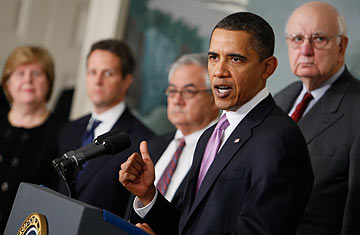
Obama talks about financial reform
President Obama's new proposals to crack down on Wall Street — first the new tax on big banks last week, then Thursday's new restrictions on big banks — signal a somewhat new approach to financial reform. But they also signal a very new approach to politics and governing: more populist, more confrontational, less deferential to Congress, less eager for common ground. His uncharacteristically blunt message to financial giants and their political defenders said it all: "If these folks want a fight, it's a fight I'm ready to have."
Obama outlined his plan for $117 billion worth of bank taxes to recoup the costs of bailouts even before Scott Brown's Massachusetts victory gave Republicans the 41st vote they need to filibuster the Senate. The newest proposals — further limits on the size and risk profiles of financial firms, plus bans on commercial banks playing the markets with their own cash or owning hedge funds or private-equity funds — had also been debated internally for months. But no matter what the White House spinners say, the heightened emphasis on taming Wall Street is a direct response to Obama's political problems in the Senate and throughout the nation. To give another example, the Administration first proposed a stand-alone consumer-protection agency for financial products last June, but only Tuesday did it leak that Obama considers the agency non-negotiable.
The real message behind all the bank-bashing is that Obama is shifting gears for his second year in office. Instead of calling for general reforms and letting Congress work out the details, he wants to draw bright lines and force lawmakers to choose sides: Do you want to reform the financial system after the worst financial crisis since the Great Depression or do you want to protect the status quo on Wall Street? After cobbling together 60 Senators for health reform through endless delays and deals — which thanks to Brown would now require cooperation from at least one Republican along with a number of skittish or recalcitrant or opportunistic Democrats — the White House wants to take financial reform to the court of public opinion and pressure Congress to go along. Obama made it clear that when it came to health care he would sign just about any bill; with finance, he's putting down markers that he's perfectly willing to accept no bill (and a potentially explosive political issue) as opposed to a watered-down compromise bill.
The new focus also reveals a power shift inside the Administration, a smackdown of Treasury Secretary Timothy Geithner, White House aide Lawrence Summers and other centrists who consider populism a dirty word, and have been accused (often unfairly) of being too close to Wall Street. Former Federal Reserve Chairman Paul Volcker, the head of Obama's Economic Recovery Advisory Board, has spent the past year getting frozen out of the White House while blasting Wall Street as a glorified casino; yesterday, he stood next to Obama as the President described the proposed ban on proprietary trading by commercial banks as "the Volcker rule." Other White House economic aides have also chafed at the influence of Geithner and Summers; one of them recently told me that if I wanted to understand financial reform, I should talk to MIT's Simon Johnson, who until last week was trashing the Administration's reforms as a cave-in to Wall Street.
Really, though, this shift is more about politics than substantive differences in policy. Geithner strongly supports a stand-alone consumer agency, and he devised the plan to impose taxes on liabilities of the biggest banks, not only to recoup the bailout money but to discourage excessive risk-taking and excessive size. He just happens to be allergic to populism, and Obama political adviser David Axelrod wants to strike a much more populist are-you-with-us-or-the-banks tone in 2010. Axelrod and Obama aide Valerie Jarrett met at the White House on Wednesday with Harvard law professor and TARP watchdog Elizabeth Warren, the mother of the stand-alone consumer-agency proposal and an outspoken advocate for reform; their message was that they'd welcome a fight with Wall Street.
So what happens next? Last month, the House narrowly passed a financial-reform bill that included many of the Administration's priorities, including a strong consumer agency. It received no Republican votes. Senate Banking Committee chairman Christopher Dodd has been trying to forge a bipartisan consensus around a similar bill, but Republicans have made it clear that the consumer agency is a deal breaker. And the Hill is swarming with financial lobbyists who are desperate to preserve the status quo.
The fact that Obama is now calling for even tougher measures may make it even tougher to attract votes from Republicans or finance-friendly Democrats like Tim Johnson of South Dakota, where Citigroup (like most card issuers) has chartered its credit-card division. But Republicans haven't shown much inclination to cast votes to help Obama get anything done. And even if there were still 60 Democrats in the Senate, the health care saga demonstrated the difficulty of keeping them all on board without watering down the legislation, infuriating the party's base and ultimately disgusting the electorate through extended exposure to the sausagemaking process. The only plausible road to financial reform is for it to become so popular that even Republicans are afraid to obstruct it.
That clearly hasn't happened yet; Brown opposed Obama's proposed taxes on big banks as un-American taxes on success, and Republicans on the Hill remain confident that the larger issue is far too complex for Democrats to turn into a referendum on Wall Street. But Obama is obviously eager to try. The goal of his fight is not necessarily to win. It's to show Americans that he's fighting, and who's fighting against him.
